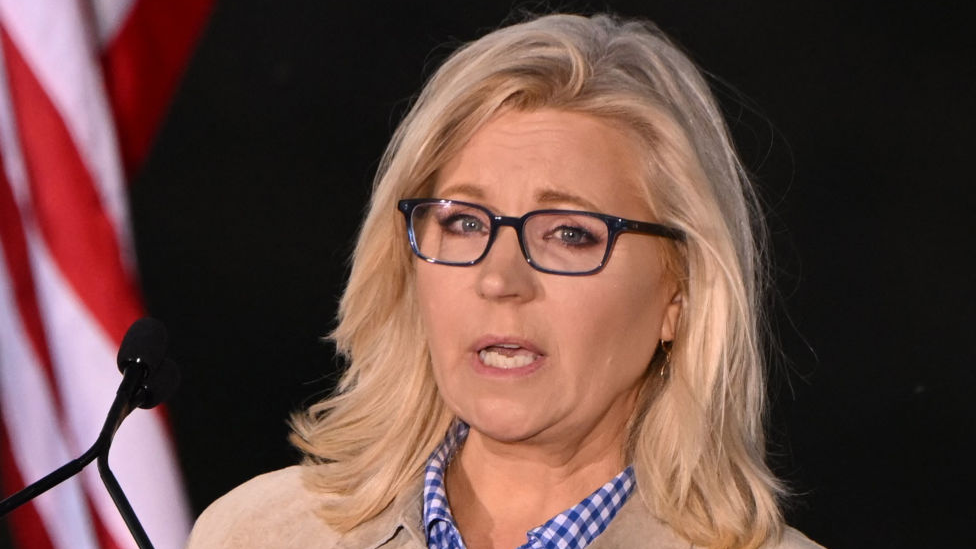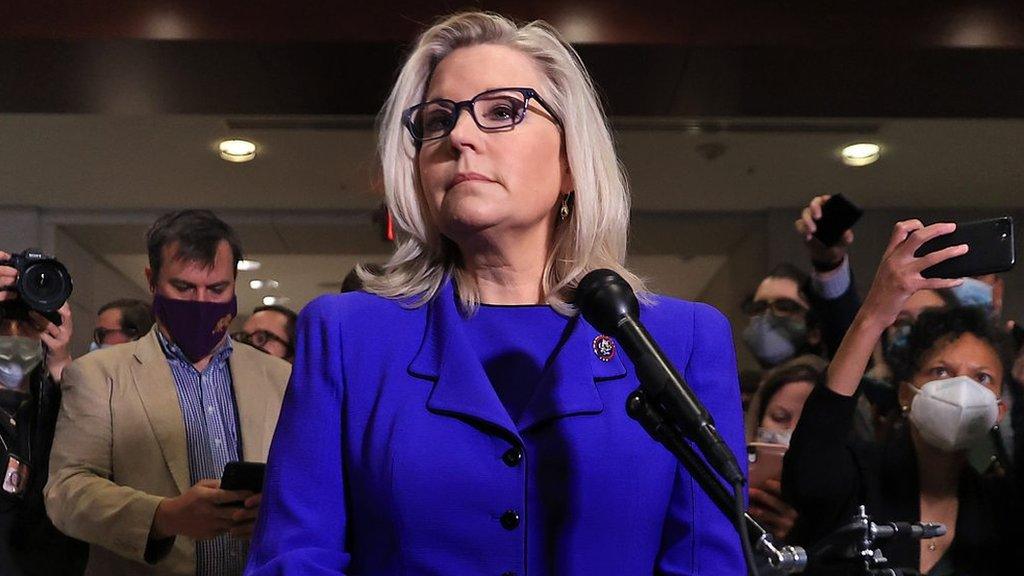Liz Cheney vs Donald Trump: Why it's not over yet
- Published

Liz Cheney's concession speech had all the trappings of a presidential bid announcement
Donald Trump says Republican voters sent Liz Cheney to "political oblivion" with her crushing election defeat at the hands of a candidate he endorsed. But not so fast - here's how one of the former president's biggest critics could still hurt him if he runs for re-election.
Martin Kimmet is a gentle man. He loves his pretty cows, reliable horses and beautiful state, in roughly that order. I joined him cattle wrangling in Wyoming recently to talk politics. His cows had escaped and he needed help to get them back, I was the only person on horseback at the time. 'No' wasn't an option.
Now, I can ride, but I'm no wrangler. Fortunately, Martin couldn't have been kinder. He was a gracious guide - to cattle, and conservatives.
So I was a little taken aback by the vehemence of his email celebrating congresswoman Cheney's defeat to a Trump-backed candidate in her primary race on Tuesday. "We are ready to play hardball and we will win," he wrote, adding "God bless us and guide us." Martin believes the result shows that conservatives in Wyoming aren't going to be "bullied by the elite any longer."
But what if it shows something else? Or rather, presages something else? Something quite different, a moment of rebirth for the Republican establishment.
Perhaps it's a quirk of timing, but Liz Cheney's defeat comes at a moment when the centre of American politics looks ready for revival. And she could be part of it.
Cheney's concession speech had all the trappings of a presidential bid announcement. There were American flags, hay bales, majestic mountains and a stunning sunset. The small crowd was a bit of a problem, but the scene was perfect. It just lacked the announcement.
On Wednesday, when repeatedly asked if she would run for president in 2024, Cheney edged a little closer. "That's a decision that I'm going to make in the coming months… it is something that I am thinking about," she told NBC.
As Cheney herself must know, there is not a hope in hell that she could beat Donald Trump to the Republican nomination in 2024 (if he chooses to run again). She has burned too many bridges with millions of Trump supporters. As Martin Kimmit told me proudly, we "fired Liz Cheney!"
But beating Trump herself is not what matters to Cheney. She has made clear she plans to be part of a bipartisan coalition whose goal is to ensure he never holds office again.
One way would be to appeal directly to suburban Republicans, particularly women, who may be on the fence about the former president becoming a future president.
As a politician who never talked much about gender, Cheney has made a noticeable effort recently to talk about women. She's spoken about the bravery of the women who have testified in the 6 January hearings, contrasting them with the men who didn't speak up. In her final hearing she chose to wear a white jacket, the colour of American suffragettes. On the campaign trail in Wyoming she's talked directly about mothers and daughters. She seems almost to be priming herself to have influence with other women voters in upcoming campaigns.
Watch: “Brave and smart as a whip” or “a swamp rat politician” - how Republican voters see Liz Cheney
If Trump were to be the Republican nominee, Cheney could be a thorn in his side - potentially peeling away enough votes in the suburbs of Philadelphia, and Atlanta and Phoenix to make a difference in battleground states. She could do all this as an outspoken Republican voice on TV shows and at rallies. She wouldn't even need to be a candidate because she already has name recognition and cable news hosts are longing to book her.
To have an impact, however, she needs to make this about her cause - stopping Trump becoming president again - rather than herself. Despite the adulation Cheney is getting today from Democrats, she is a conservative, anti-abortion Republican who voted with Donald Trump 93% of the time when he was in the White House. If the focus is on her, and her policies, she could turn off some of those moderates she hopes to win over.
And this is where timing comes in.
Cheney's defeat comes after a week in which the legal travails of Donald Trump have dominated US airwaves, prompting a wave of violent language from some supporters on social media. There is some sense that Trump exhaustion is setting in. "I'm pretty sure that calls to defund the FBI is not a winning slogan with suburban women voters," says Republican strategist Susan del Percio. She says she hears from Republicans who were proud to vote for the former president but now say they are done with Trump because of all the drama.
While Trump-endorsed candidates have had much success in winning nominations, the midterms in November are a different matter. Early polls suggest some of the candidates backed by the former president - who have shared his unfounded claims about the 2020 election - aren't performing well in their races against Democrats. Trump favourites in Arizona, Pennsylvania and Georgia are all behind right now. At the same time, some more centrist Democrats in New Jersey and Virginia, who were expected to do badly in November, appear to be doing better. Wyoming may not be the template for the rest of the country.
Clearly Liz Cheney isn't planning to retire quietly to the mountains of Jackson Hole. She has a mission. On the face of it, it seems a mission impossible. In a head to head, she couldn't beat Donald Trump, who is far more popular than she is. But if the mission is just to stop him, well then perhaps it's not so impossible after all.
- Published17 August 2022

- Published17 August 2022

- Published3 August 2022

- Published15 May 2021
